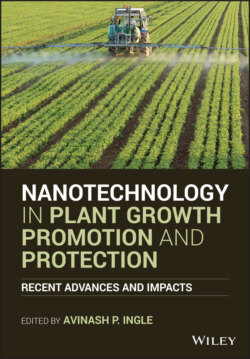Читать книгу Nanotechnology in Plant Growth Promotion and Protection - Группа авторов - Страница 48
3.2 Applications and Effects of Zn Based NPs on Plant Growth Promotion 3.2.1 Zn NPs in Seed Treatments and Its Effects
ОглавлениеRecently, Zn NPs have attracted a great deal of attention from the scientific community around the globe for their use in seed treatment. Various seed treatment methods such as wet treatments, including seed coating and seed dipping are commonly used to improve seed health (Taylor et al. 2001). In the seed film coating process, NPs are often mixed with other substances such as clay then applied as a thin layer over the seed surface (Butler 1993; Taylor 1999). There are different methods are proposed to treat seed with Zn NPs (Figure 3.1). Seeds can be first soaked into Zn NPs suspension for a certain time and dried to an original moisture content of the seed. Besides, seeds can also be partially or completely dipped in a small amount of Zn NPs suspension for a certain time then followed by germination without drying. Lastly, seeds can be soaked in a large volume of Zn NPs suspension for the limited time period and allowed to germinate without drying (Panda 2017).
In general, seed priming requires a high concentration of ZnO (more than 500 mg/L). For example, maize seed treatment with ZnO NPs (25 nm) at 1500 mg/L was found optimum for seed germination (increased by 40%) and seedling vigor (root and shoot length increased by >50%) (Subbaiah et al. 2016). Elhaj Baddar and Unrine (2018) also reported positive effects of ZnO, ZnO core Zn3(PO4)2 shell or dextran‐coated ZnO NPs without adverse effects on wheat seedling growth with concentration about 500 mg/L. A study on peanuts also shows positive effects of nanoscale ZnO (25 nm) during germination, where 1000 mg/L treated seed produced the highest germination percentage and seed vigor index (Prasad et al. 2012). However, for certain crops, ZnO NPs can be effective at a concentration lower than 100 mg/L. Munir et al. (2018) found a linear increment in wheat seed germination and seedling growth after seed priming with ZnO NPs from 25 to 100 mg/L concentration. Similarly, Panda (2017) showed a linear increment of positive effects of Zn NPs from 5 to 50 mg/L (30–60 nm) on rice seed germination and enzyme activity through seed soaking for one hour with a significant increment in SOD and antioxidant enzymes (reductases).
